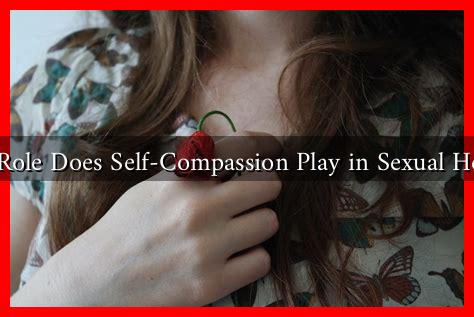-
Table of Contents
- What Role Does Self-Compassion Play in Sexual Healing?
- Understanding Self-Compassion
- The Connection Between Self-Compassion and Sexual Healing
- 1. Reducing Shame and Guilt
- 2. Enhancing Emotional Resilience
- 3. Promoting Healthy Relationships
- Practical Strategies for Cultivating Self-Compassion in Sexual Healing
- Conclusion
What Role Does Self-Compassion Play in Sexual Healing?
Sexual healing is a multifaceted process that encompasses emotional, psychological, and physical dimensions. It often arises from experiences of trauma, abuse, or negative sexual experiences that can leave lasting scars. In this context, self-compassion emerges as a vital tool for individuals seeking to reclaim their sexual well-being. This article explores the role of self-compassion in sexual healing, highlighting its benefits, mechanisms, and practical applications.
Understanding Self-Compassion
Self-compassion, as defined by Dr. Kristin Neff, involves treating oneself with kindness, recognizing one’s shared humanity, and being mindful of one’s thoughts and feelings. It contrasts sharply with self-criticism, which can exacerbate feelings of shame and inadequacy. Self-compassion consists of three core components:
- Self-Kindness: Being warm and understanding toward oneself during difficult times.
- Common Humanity: Recognizing that suffering and personal inadequacy are part of the shared human experience.
- Mindfulness: Holding painful thoughts and feelings in balanced awareness rather than over-identifying with them.
The Connection Between Self-Compassion and Sexual Healing
Self-compassion plays a crucial role in sexual healing by fostering a supportive internal environment that encourages recovery and growth. Here are several ways in which self-compassion contributes to this process:
1. Reducing Shame and Guilt
Many individuals who have experienced sexual trauma carry deep feelings of shame and guilt. Self-compassion helps to mitigate these feelings by:
- Encouraging individuals to view their experiences through a lens of understanding rather than judgment.
- Promoting the idea that suffering is a universal experience, which can alleviate feelings of isolation.
For instance, a study published in the journal *Psychology of Women Quarterly* found that women who practiced self-compassion reported lower levels of sexual shame, which in turn facilitated healthier sexual relationships.
2. Enhancing Emotional Resilience
Self-compassion fosters emotional resilience, allowing individuals to navigate the complexities of their feelings related to sexual experiences. This resilience can manifest in several ways:
- Encouraging individuals to confront and process their emotions rather than suppressing them.
- Facilitating a more adaptive response to setbacks in the healing journey.
Research indicates that self-compassionate individuals are more likely to engage in positive coping strategies, such as seeking support and practicing self-care, which are essential for sexual healing.
3. Promoting Healthy Relationships
Self-compassion not only benefits the individual but also enhances interpersonal relationships. When individuals practice self-compassion, they are more likely to:
- Communicate openly about their needs and boundaries.
- Engage in healthier, more fulfilling sexual relationships.
A case study involving survivors of sexual abuse revealed that those who cultivated self-compassion were better able to establish trust and intimacy in their relationships, leading to more satisfying sexual experiences.
Practical Strategies for Cultivating Self-Compassion in Sexual Healing
Integrating self-compassion into the sexual healing process can be achieved through various practices:
- Mindfulness Meditation: Engaging in mindfulness practices can help individuals become more aware of their thoughts and feelings without judgment.
- Self-Compassion Exercises: Writing letters to oneself or practicing self-kindness during moments of distress can reinforce self-compassion.
- Therapeutic Support: Working with a therapist who specializes in trauma and self-compassion can provide guidance and support.
For more resources on self-compassion, you can visit self-compassion.org.
Conclusion
Self-compassion is a powerful ally in the journey of sexual healing. By reducing shame, enhancing emotional resilience, and promoting healthier relationships, self-compassion creates a nurturing environment for recovery. As individuals learn to treat themselves with kindness and understanding, they pave the way for a more fulfilling and empowered sexual life. Embracing self-compassion is not just a personal journey; it is a collective movement toward healing and wholeness in the realm of sexuality.


